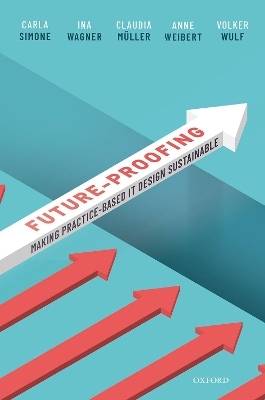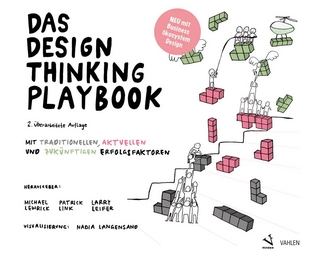
Future-proofing
Oxford University Press (Verlag)
978-0-19-886250-5 (ISBN)
Innovative research solutions increasingly require deep engagement with practitioners to manage the complex problems they are attempting to solve. This often project-based research is equipped with finite resources over a limited period without much thought into future-proofing the practice. These projects must face questions of what happens when a product comes to an end and whether there are any lasting positive effects once the IT systems are no longer being actively developed. From a computing perspective, the challenge is to design IT artifacts that contribute to improving the user's work and everyday life in a sustainable way, thereby also contributing to social and ecological sustainability.
Future-Proofing: Making Practice-Based IT Design Sustainable documents the experiences made by several leading research groups in Europe, North America, and South Africa. It describes their efforts to achieve sustainable design results, the difficulties that barred the way but also the strategies they adopted to achieve the goal of sustainability. The analysis of these cases has inspired thinking about how to more systematically address and possibly overcome the impediments to sustainability.
This book develops a strong future-oriented perspective that conceptualizes sustainability as a complex and highly variegated issue and formulates insights and recommendations with a view to help researchers to better design for sustainability.
Carla Simone is a recognized European academic in the field of design of collaborative technologies. Her early research interests concerned ICT languages and architectures and the modelling of organizational processes. Since the '90, her research in the CSCW (Computer Supported Cooperative Work) area focuses on field studies to shape the design of malleable collaborative technologies and their modular architectures. She contributed to numerous books and authored over 100 papers on the above issues with a special focus on the relationship between users and ICT professionals in design. Until September 2015 she was full professor at the University of Milano Bicocca where she leaded the Computer Science curricula for several years. She currently holds a visiting position at the University of Siegen. Ina Wagner is a leading European academic in the field of work and technology. Her research in the area of CSCW (Computer Supported Cooperative Work) and PD (Participatory Design) focuses on the study of work practices and the design of supporting technologies. She engaged early on in analysing ethical and political aspects of ICT, with a focus on medical technologies. She has edited and written numerous books and authored over 160 papers on a variety of technology-related issues, amongst them computer-support of hospital work and of architectural design and planning, participatory design, and a feminist perspective in science and technology. Until September 2011 she was Head of the Institute for Technology Assessment and Design, Vienna University of Technology. She currently holds a visiting position at the University of Siegen. Claudia Müller is assistant professor of information systems, especially IT for the ageing society, at the University of Siegen, Germany, and a professor of Careum Health Research at the Kalaidos University of Applied Sciences, Switzerland. Her research focus is on the co-production of digital tools to promote empowerment and social and digital participation in the health & ageing sector. Prof. Müller is deputy chair of the expert commission of the Eighth Ageing Report "Ageing & Digitalisation" of the German federal government, co-chair of the expert committee "Education and Digitalisation in Old Age" of the German federal ministry of family affairs and co-chair of the expert committee "Age and Technology" of the German Society for Gerontology and Geriatrics. Anne Weibert is a research associate at the Institute for Information Systems and New Media, University of Siegen. Her research interest is in computer-based collaborative project work and inherent processes of technology appropriation, intercultural learning and community-building. She has conducted participatory design works with children and adults, and vulnerable populations including refugees in socially and culturally diverse settings. Volker Wulf is a professor for Information Systems and New Media at the University of Siegen. He is also the Managing Director of the School of Media and Information (iSchool) at the University of Siegen. Wulf had visiting appointments at Massachusetts Institute of Technology, University of Michigan, and Stanford University. Since 2018 he is a member of the CHI-Academy. His research interests lie primarily in the area of Socio-Informatics, taking a practice-based approach to the design of IT systems in real-world settings. This includes the development of innovative applications in the areas of cooperation systems, knowledge management and community support. One special focus lies on flexible software architecture which can be adapted by end-users. Further research focuses on methods of user-oriented software development and introduction processes.
SECTION I - FRAMING THE BOOK
1: Introduction
2: Sustainability: the conceptual space
SECTION II - CASE STUDIES
3: Bringing Industry 4.0 to small and medium enterprises
4: Emergency and crisis management
5: Healthcare at the hospital and at home
6: Integration of healthcare services and technologies
7: Learning across cultures and communities
8: Projects in developing countries
9: Research projects in IT service companies
10: Beyond individual projects: university spin-offs
SECTION III - ANALYSIS AND DISCUSSION
11: Looking across and connecting
12: The complex way to sustainability
SECTION IV - EPILOGUE
13: Personal experiences and reflections
| Erscheinungsdatum | 04.02.2022 |
|---|---|
| Zusatzinfo | 3 Illustrations |
| Verlagsort | Oxford |
| Sprache | englisch |
| Maße | 162 x 240 mm |
| Gewicht | 784 g |
| Themenwelt | Informatik ► Software Entwicklung ► User Interfaces (HCI) |
| ISBN-10 | 0-19-886250-4 / 0198862504 |
| ISBN-13 | 978-0-19-886250-5 / 9780198862505 |
| Zustand | Neuware |
| Informationen gemäß Produktsicherheitsverordnung (GPSR) | |
| Haben Sie eine Frage zum Produkt? |
aus dem Bereich


